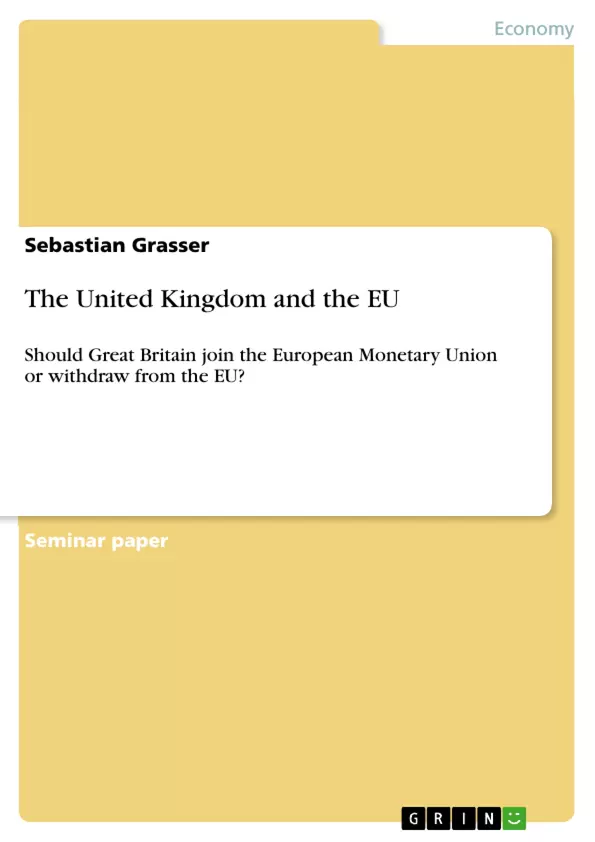My following paper will deal the article of Nigel Pain and Garry Young, ‘The macroeconomic impact of UK withdrawal from the EU’, from Economic Modelling, Volume 21, Issue 3. The article focuses on both the costs and benefits of a UK withdrawal from the EU. I will show that withdrawing from the European Union is not to aspire for the UK. Furthermore I will explore whether or not it would be advisable for the UK to abolish its national currency, the Sterling, and to adopt the European Currency, the Euro.
Inhaltsverzeichnis (Table of Contents)
- Withdrawing from the EU: macroeconomic advantages and disadvantages for the UK
- Nigel Pain's and Garry Young's article on the economic impact of UK withdrawal from the EU
- Economic changes from leaving the European Union
- Macroeconomic effects of withdrawal
- Adopting another way: benefits and disprofits of joining the EMU
- Benefits from joining the EURO.....
- Disadvantages from joining the eurozone ..........\li>
- Conclusion: better off with the European Union but without the Euro........
Zielsetzung und Themenschwerpunkte (Objectives and Key Themes)
This paper analyzes the economic consequences of the UK withdrawing from the European Union, drawing on Nigel Pain and Garry Young's article "The macroeconomic impact of UK withdrawal from the EU." The paper explores both the potential benefits and drawbacks of such a withdrawal and examines whether joining the European Monetary Union would be a better alternative for the UK.
- Macroeconomic consequences of UK withdrawal from the EU
- Economic changes resulting from leaving the European Union
- Impact of withdrawal on foreign direct investment (FDI), technical progress, and exports
- Analysis of trade policy, agricultural policy, and budgetary implications
- Evaluation of the potential benefits and disadvantages of joining the European Monetary Union (EMU)
Zusammenfassung der Kapitel (Chapter Summaries)
- Withdrawing from the EU: macroeconomic advantages and disadvantages for the UK: This chapter introduces Nigel Pain and Garry Young's article and outlines their analysis of the macroeconomic impact of UK withdrawal from the EU. It discusses the methodology employed by the authors and highlights their findings regarding the potential costs and benefits of leaving the EU.
- Economic changes from leaving the European Union: This chapter delves into the specific economic changes that might occur after the UK leaves the EU, focusing on four key areas: foreign direct investment (FDI), trade policy, agricultural policy, and budgetary implications. The chapter discusses the potential impact of these changes on various aspects of the UK economy.
- Macroeconomic effects of withdrawal: This chapter examines the macroeconomic effects of withdrawal from the EU, drawing on the findings of the National Institute model of the UK economy (NIDEM). It analyzes the impact of withdrawal on key economic indicators such as GDP, employment, and inflation.
Schlüsselwörter (Keywords)
This paper explores key concepts related to the UK's relationship with the European Union, including the economic impact of withdrawal, trade policy, foreign direct investment, agricultural policy, budgetary implications, macroeconomic modeling, and the potential benefits and drawbacks of joining the European Monetary Union.
Frequently Asked Questions
What is the main focus of the paper regarding the UK and the EU?
The paper analyzes the economic consequences of the UK withdrawing from the European Union, specifically examining the macroeconomic impacts, costs, and benefits based on research by Nigel Pain and Garry Young.
Does the author recommend that the UK leave the European Union?
No, the author argues that withdrawing from the European Union is not a desirable goal for the United Kingdom based on the macroeconomic analysis provided.
What specific economic areas are impacted by a UK withdrawal?
The paper explores changes in foreign direct investment (FDI), technical progress, exports, trade policy, agricultural policy, and budgetary implications.
What is the paper's stance on the UK adopting the Euro?
The conclusion suggests that the UK is better off staying within the European Union but remaining outside of the Eurozone (the European Monetary Union).
Which economic model is used to examine the effects of withdrawal?
The paper draws on findings from the National Institute model of the UK economy (NIDEM) to analyze indicators like GDP, employment, and inflation.
- Arbeit zitieren
- Sebastian Grasser (Autor:in), 2006, The United Kingdom and the EU, München, GRIN Verlag, https://www.grin.com/document/76786



